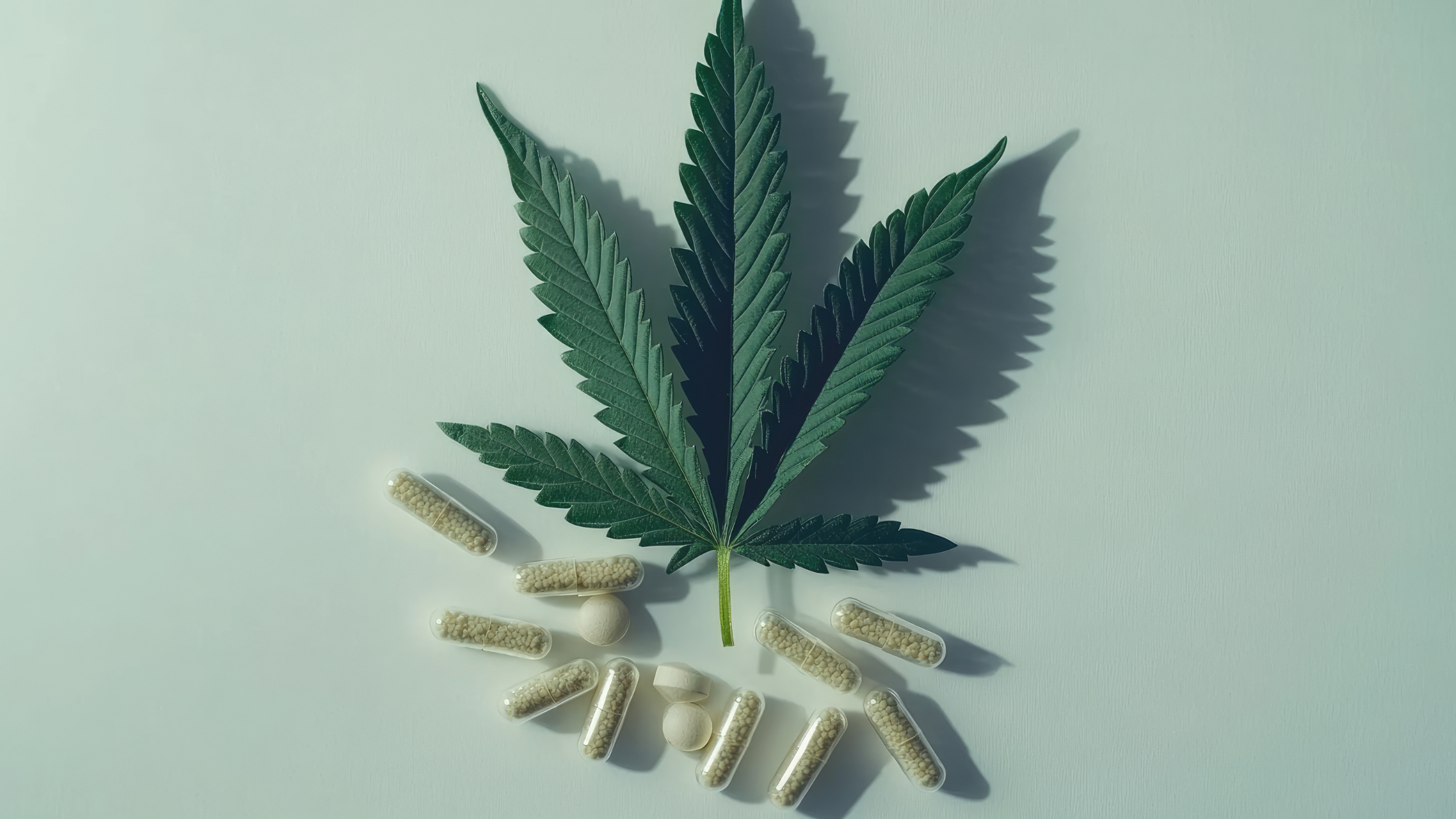Cannabinoids like THC, CBD, CBN, and CBG are widely used for relaxation, focus, pain relief, and sleep—but how do they interact with medications or supplements you may already take?
While most people tolerate them well, certain combinations can affect how prescription medications are processed in your body. This guide breaks down what researchers currently know about potential interactions and when it’s best to check with a healthcare professional.
Disclaimer: This article is for general information only and not medical advice. Always talk with your doctor or pharmacist before combining cannabinoids with prescriptions or supplements.
How THC, CBD, CBN, and CBG Are Processed in the Body
All major cannabinoids are metabolized by liver enzymes called cytochrome P450 (CYP450). These same enzymes break down hundreds of common medications. When cannabinoids use the same pathway, they can either slow or speed up how quickly a drug leaves your system.
-
Inhibition: Slows metabolism, possibly increasing drug levels or side effects
-
Induction: Speeds metabolism, potentially reducing a drug’s effectiveness
Each person’s enzyme activity varies, so interaction strength can differ widely.
-
CBD – Strongest CYP450 inhibitor among cannabinoids (especially CYP3A4, CYP2C9, CYP2C19)
-
THC – Milder metabolic effects; can raise heart rate and lower blood pressure
-
CBN – Mildly sedative and may inhibit CYP2C9 and CYP3A4 (weaker than CBD)
-
CBG – “Mother cannabinoid,” may weakly inhibit CYP2D6 (affecting antidepressants and stimulants)
Common Medication Interactions
Antidepressants (SSRIs, SNRIs)
Cannabinoids may compete with medications like Zoloft (sertraline), Prozac (fluoxetine), or Effexor (venlafaxine) for liver metabolism. This could modestly increase drowsiness or emotional blunting.
Tip: If you use CBD or CBG for focus or anxiety relief, start low and monitor for changes in alertness or mood.
Anti-Anxiety Meds or Sedatives
THC, CBN, and CBD can amplify sedation when combined with benzodiazepines (Xanax, Ativan, Valium) or sleep aids.
Tip: Avoid stacking sedatives. If combining, take very small doses and never mix with alcohol, always consult your doctor.
Blood Thinners (Warfarin, Apixaban)
CBD and CBN can inhibit CYP2C9 and CYP3A4—the same enzymes that process many anticoagulants. This may increase bleeding risk.
Tip: If you take blood thinners, always tell your doctor before using any hemp or cannabis products.
Seizure or Anti-Epileptic Medications
High-dose CBD (≥300 mg/day) can raise liver enzyme levels, especially with valproate or clobazam.
Tip: Work with your prescriber to monitor liver function and dosage carefully.
Blood Pressure & Heart Medications
THC can briefly increase heart rate and lower blood pressure.
Tip: Combining THC with beta-blockers or antihypertensives may cause dizziness or fatigue. CBG might balance THC’s intensity, but research is limited.
Pain Medications
Opioids, muscle relaxants, and some anti-inflammatories already cause drowsiness. Adding THC, CBN, or CBD can heighten that effect.
Tip: Use the lowest effective dose and consult your doctor for guidance.
Supplement and Natural Product Interactions
Grapefruit and CBD
Both grapefruit and CBD inhibit CYP3A4. Taking them together can slow the metabolism of many drugs like statins or calcium-channel blockers.
If your medication carries a “grapefruit warning,” use CBD with caution.
Herbal Relaxants (Kava, Valerian, Chamomile)
These natural relaxants can compound sedation when used with THC, CBN, or CBD.
Tip: Avoid taking them at the same time, especially in products meant for sleep.
St. John’s Wort
A strong enzyme inducer that can reduce cannabinoid blood levels, possibly making products feel weaker or shorter lasting.
Research is limited, but the effect is likely similar to how St. John’s Wort reduces certain medication levels.
Caffeine and Stimulants
THC and CBD can slightly alter heart rate and blood pressure, while CBG may act as a mild focus enhancer.
Tip: Combining cannabinoids with caffeine or stimulant supplements can heighten anxiety or jitteriness.
Key Safety Principles
-
Start low and go slow.
Begin with minimal doses and increase gradually to gauge your body’s response. -
Separate timing.
Taking prescriptions and cannabinoids at different times may reduce overlap—but confirm timing with your pharmacist. -
Avoid stacking sedatives.
Don’t mix THC, sleep meds, alcohol, or antihistamines without medical guidance. -
Monitor your body.
Dizziness, nausea, or new fatigue may signal an interaction. Pause use and contact your doctor.
CBDX Transparency & Quality Control
At CBDX.com, every product is:
-
Farm Bill compliant and third-party lab tested
-
Clearly labeled with cannabinoid content and batch COAs
-
Formulated for precision, so you can control dosage and avoid surprises
Our goal is to empower responsible, informed use—not to replace medical advice.
If you take prescriptions, always consult your clinician so they can check for potential interactions.
Frequently Asked Questions
Can I take CBD or CBG while on antidepressants?
Possibly—but only under medical supervision. Both can affect how SSRIs are metabolized.
Is it safe to mix THC or CBN gummies with sleep medication?
Combining two sedatives can increase drowsiness. Discuss timing and dosage with your healthcare provider. Ideally, THC and CBN gummies would replace other sleep medications that have unwanted side effects, not be used in conjunction.
What about vitamins or protein supplements?
Standard vitamins and protein powders have no known cannabinoid conflicts, but check for added herbs or stimulants.
Does CBD interact with alcohol?
Both relax the nervous system. Mixing them can cause stronger sedation or slower reaction times.
Is CBG safer to combine with other medications?
CBG tends to have fewer interaction risks, but data is limited. Use the same caution as with CBD or THC.
Final Thoughts
Cannabinoids are generally well tolerated, but they can change how your body processes medications. Understanding these pathways helps you use them safely and confidently.
If you take prescriptions or daily supplements, always check with your healthcare provider before adding THC, CBD, CBN, or CBG.
Transparency, moderation, and awareness are key.
At CBDX, we believe in hemp-derived products that support wellness without guesswork—clean labeling, full COAs, and cannabinoid blends designed for precision and peace of mind.





